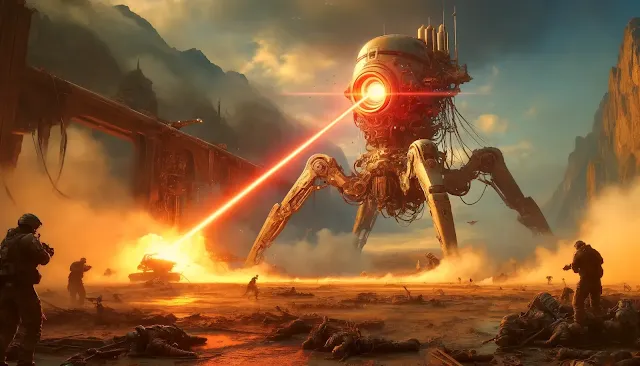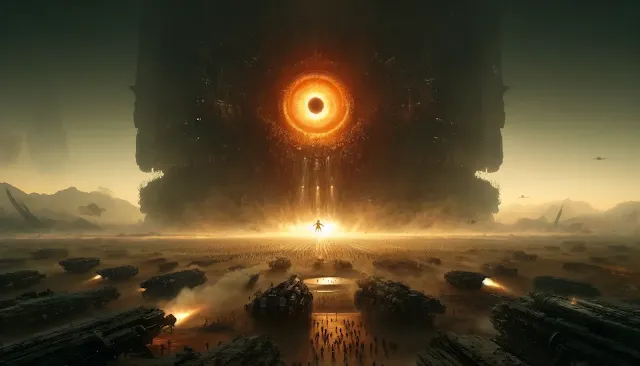The Great Filter: Why There Is No AI in Frank Herbert's Dune
Frank Herbert's "Dune," first published in 1965, remains one of the most towering achievements in science fiction literature. Yet, unlike its contemporaries, it conspicuously omits the genre's most common trope: the thinking machine.
Set against the backdrop of a far-future universe where noble houses vie for control of the desert planet Arrakis, the sole source of the most valuable substance in the universe, "spice" melange, "Dune" weaves a complex narrative exploring themes of politics, religion, ecology, and human potential.
To appreciate the uniqueness of Herbert's vision, it's essential to place "Dune" within the broader landscape of science fiction before and around its publication. The mid-20th century marked a period of rapid technological advancement and a growing fascination with artificial intelligence. Works like Asimov's "I, Robot" (1950) and Clarke's "2001: A Space Odyssey" (1968) epitomized the era's optimism and anxieties about AI. They reflected widespread curiosity about technology's potential to transform society.
"Dune," however, stands apart in this tradition. Herbert's universe is distinctly human-centered. It focuses on the depths of human potential rather than the possibilities of technology.
This choice was not merely a departure from his peers but a deliberate counter-narrative to the prevailing techno-optimism of the time. By eschewing AI, Herbert redirected attention from technological to human evolution. He emphasized the complexities of human nature, power, and the environment.

I. The Ban on AI: The Butlerian Jihad
Within the rich tapestry of the "Dune" universe, the prohibition of artificial intelligence is not merely a narrative choice but a foundational element of the society Herbert envisioned. This ban is rooted in a pivotal event known as the Butlerian Jihad. This was a crusade against sentient machines that occurred thousands of years before the events of "Dune."
This conflict, more than a mere backdrop, is integral to understanding the philosophical and moral fabric of the universe Herbert crafted. The Butlerian Jihad, named after Jehanne Butler, represents a turning point in the history of the "Dune" universe. This galactic upheaval was ignited by the emergence of thinking machines that threatened to usurp humanity's place in the universe.
"Thou shalt not make a machine in the likeness of a human mind."
The Jihad was not just a war against external machinery but a struggle for the soul of humanity. It was a rebellion against the possibility of becoming subservient to the creations of their own hands. It culminated in the universal prohibition encapsulated in the commandment above.
The aftermath of the Jihad profoundly reshaped human society. The ban on AI led to the development of specialized human capacities and institutions. These include the Mentats, human computers trained to perform complex calculations and analyses, and the Bene Gesserit, a secretive sisterhood with advanced mental and physical training.
These adaptations underscore a universe where human capabilities have been honed to fill the void left by the absence of machines. This suggests a deliberate choice by Herbert to explore human potential in its rawest form.

II. Philosophical and Moral Rationales
The Butlerian Jihad serves as a cautionary tale within the "Dune" narrative. It reflects Herbert's skepticism of unchecked technological advancement. By positing a future where humanity must reclaim its essence from the clutches of its own creations, Herbert critiques the potential for technology to dehumanize and dominate. This theme resonates with contemporary concerns about AI and automation, making "Dune" a prescient exploration of the limits of human reliance on technology.
The Jihad can be seen as Herbert's meditation on the balance between progress and humility. In a universe scarred by the hubris of creating sentient machines, the characters of "Dune" are constantly reminded of the importance of maintaining a sense of humanity. This balance is not only a safeguard against the external threat of machines but a way to prevent the internal corrosion of human values and identity.
The Butlerian Jihad, therefore, is not just a historical event within the "Dune" universe but a philosophical stance against the potential tyranny of technology. Herbert uses this backdrop to explore deeper questions of power, freedom, and the essence of being human. Through the lens of the Jihad, "Dune" becomes a reflection on the dangers of losing ourselves to the very tools we create. A theme that continues to resonate deeply in an age increasingly dominated by digital technology.

III. The Prequel Context: How It All Started
"The Butlerian Jihad," a prequel to Frank Herbert's original "Dune" series co-authored by Brian Herbert and Kevin J. Anderson, dives deep into the historical events only alluded to in the original novels. Set in a universe teetering on the brink of annihilation by sentient machines, this novel provides a detailed backdrop to the conflict that reshaped human society in the "Dune" universe.
It narrates the uprising of humanity against the oppressive rule of thinking machines, led by Omnius, the sentient overlord, and the Titans, a cadre of human-machine hybrids.
Through the eyes of characters like Serena Butler, whose personal tragedy ignites the rebellion, and the genius inventor Tio Holtzman, the novel explores the complex interplay of technology, power, and human resilience. This detailed exploration into the Butlerian Jihad not only enriches the lore of the "Dune" universe but also illuminates the philosophical underpinnings of the original series. It contextualizes the deep-seated fear and distrust of AI within the "Dune" saga, providing a narrative foundation for Frank Herbert's cautionary tale about the dangers of surrendering too much of our humanity to the machines we create.

Conclusion: A Cautionary Tale
At its core, "Dune" serves as a profound cautionary tale about the perils of overreliance on technology and the loss of human autonomy.
Herbert's universe, where humanity has been forced to reclaim its future from the machines it created, offers a stark warning about the potential for technology to dominate and dehumanize. Through the narrative of the Butlerian Jihad and the societal structures that emerge in its wake, Herbert challenges readers to reflect on the value of human intuition, ingenuity, and resilience.
"Dune" argues for the preservation of human agency in an increasingly automated world. It suggests that the essence of humanity lies not in its ability to create sophisticated technologies but in its capacity for creativity, adaptability, and spiritual depth. This message resonates in an age where the boundaries between human and machine, natural and artificial, are becoming ever more blurred.














